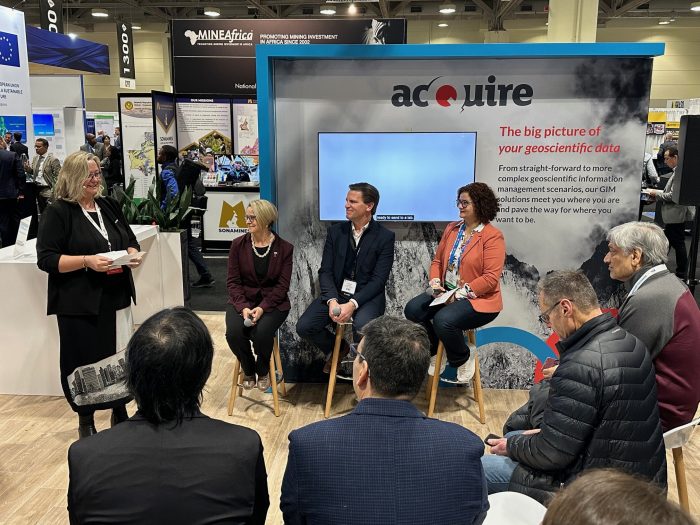Making confident decisions in the face of uncertainty: Insights from PDAC 2025
The world’s premier mineral exploration and mining convention, the Prospectors & Developers Association of Canada (PDAC), once again set the stage for industry-shaping conversations and innovations.
Drawing a crowd of more than 27,000 attendees this year, the four-day conference highlighted the industry’s need for continued collaboration and innovation to address the growing demand for critical minerals.
On the tradeshow floor, acQuire was proud to stand alongside leading technology companies, with the booth a hub of activity as technology experts and industry speakers shared their insights and prompted lively discussions around how the industry can build resilience and future-proof itself, in the face of geopolitical uncertainty.
An industry outlook
At this year’s convention, many conversations turned to how the mining and mineral exploration industry is navigating uncertain terrain due to the geopolitical climate and market volatility.
The ongoing complexity of supply chains and trade agreements has heightened the need for companies to have strategic foresight and make confident decisions. Despite these challenges, the demand for critical commodities, particularly copper and gold, is expected to surge over the next five years, with copper demand projected to grow by 70%.
As BHP CEO, Mike Henry, noted, the mining industry has never been as central to global economic discourse as it is today, with critical minerals set to drive the future of energy and technology.
The growth in critical minerals, however, is accompanied by the increasing complexity of mining deeper, more remote and technically complex ore bodies.
One thing remains clear: structured data is critical for companies to find, extract and process minerals faster and more effectively.
Discovery is a data problem
With the demand for critical minerals increasing, effective data management remains an asset to helping companies make faster and better decisions.
Fleet Space Technologies CEO, Flavia Tata Nardini, emphasised this in the technology and innovation keynote, sharing batteries alone will require another 293 new mines by 2030 yet we’re only seeing a 1 in 200 drillhole current success rate for viable deposits.
For the industry, data and processes are key to future success.
Flavia Tata Nardini further shared, mining is increasingly becoming a data insights business, and companies must shift their approach to harnessing structured, integrated data.
Nicole Janusczak, Practice Lead Predictive Capability at BHP in her Accelerating the Transformation presentation at PDAC further drives this sharing, “The hardest part of exploration shouldn’t be about finding your own data”.
Mining companies are collecting approximately 150 terabytes of data per year, less than 10 times that of what is collected in autonomous vehicles, and 333 times less than a hospital. Not only is the industry not collecting enough data, but that data is also being trapped in silos or proprietary file formats, and lacks standardisation, making it slower and more difficult to make data-driven decisions effectively.
The future of the industry may be impacted by its ability to harness data effectively to help find successful discoveries faster, while maintaining a more sustainable and efficient approach to meeting market demand.
Getting the right information to the right people
Back at the acQuire booth, acQuire hosted its annual panel discussion, “From data to decisions: Turning complex data challenges into critical business intelligence”. In this discussion, three industry speakers, Cornelia Holtzhausen, Mining Executive, David Henderson, Chief Growth Officer of the Americas at Fleet Space Technologies, and Kyra Meyer, Managing Director at Kyfer Operational Improvement, shared their insights, highlighting the necessity of getting the right information to the right people in order to make confident decisions.
[From left to right: Alison Atkins, Cornelia Holtzhausen, David Henderson and Kyra Meyer]
The discussion underscored a crucial point: businesses need to accelerate data-driven decision-making.
Many companies are turning to technology such as Artificial Intelligence (AI) to tackle this yet, they recognise that more data from diverse systems, made available in a structured, single source of truth is the way forward.
For panellist, Kyra Meyer, she acknowledged the importance of collecting more data while maintaining structure. “So having more data available right now is actually making our lives easier. It’s giving us more possibilities of thinking out of the box and defining new ways of doing things. But we always need standards and processes behind the scenes, even though those two words are very boring, they’re absolutely necessary”.
She challenged the crowd to understand why they’re collecting the data, “I would love to invite the crowd to think about why we are capturing the data and what kind of decisions we want to make out of that data. Because that’s going to streamline the process dramatically and actually get people more engaged in capturing information in a more meaningful way.”
Once the data is collected, having trusted data is essential to making better business decisions. David Henderson shares, “It goes to that old thing—garbage in, garbage out. Do you really trust the data? Is it useful? That’s changing. People are putting in similar data sets, they trust it, and then when they go on to use it later, it’s a usable set that you can leverage over and over again.”
The way forward with acQuire
As we look to the future, it’s clear data will remain the key to navigating the future with confidence.
The conversations at PDAC 2025 reinforced the industry’s growing awareness that not only must we find ways to collect more data but that it must remain structured, integrated, and accessible.
At acQuire, we’re focussed on delivering quality and sustainable software solutions that help the right information get in front of the right people to empower confident decision-making.
To find out more about acQuire’s suite of products, head to: https://page.acquire.com.au/right-information-right-people-confident-decisions



